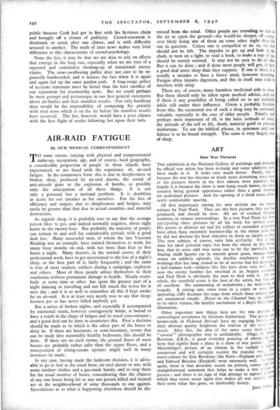AIR-RAID FATIGUE
By OUR MEDICAL CORRESPONDENT
T0 some extent, varying with physical and temperamental make-up, occupation, age, and of course, local geography, a considerable proportion of people in these islands have experienced, or are faced with the experience of, air-raid fatigue. In the commonest form this is due to sleeplessness or broken sleep, produced by air-raid alarms, the sound of anti-aircraft guns or the explosion of bombs, or possibly only the anticipation of all these things. It is not only a personal but a national problem. It is doubtless as acute for our enemies as for ourselves. For the loss of efficiency and output, due to sleeplessness and fatigue, may easily be greater than that due to actual casualties and material destruction.
As regards sleep, it is probably true to say that the average person likes to get, and indeed normally requires, about eight hours in the twenty-four. But probably the majority of people can remain fit and well for considerable periods with a good deal less. Many successful men, of whom the late Viscount Reading was an example, have trained themselves to work, for many busy months on end, with not more than four or five hours a night. Many doctors, in the normal course of their professional work, have to get accustomed to the loss of a night's sleep, or the best part of it, fairly frequently ; and the same is true of most seamen, soldiers during a campaign, explorers and others. Most of these people adjust themselves to their conditions without permanent damage to health. Nearly every- body at some time or other has spent the greater part of a night dancing or travelling and not felt much the worse for it next day ; and it is as well to remember all this if kept awake by.an air-raid. It is at least very nearly true to say that sleep- lessness per se has never killed anybody yet.
But a series of broken nights, and especially if accompanied by emotional strain, however courageously borne, is bound to have a result in the shape of fatigue and its usual concomitants ; and a good deal can be done to counteract this. First a decision should be made as to which is the safest part of the house to sleep in. If there are basement, or semi-basement, rooms that can be made into reasonably healthy bedrooms, this should be done. If there are no such rooms, the ground floors of most houses are probably rather safer than the upper floors, and a transposition of sitting-rooms upstairs might well in many instances be made.
In any case, having made the bedroom decision, it is advis- able to go to bed at the usual hour, air-raid alarms or not, with some outdoor clothes and a gas-mask handy, and to stop there for the usual number of hours, remembering that the chances of any one house being hit or any one person killed and injured are in the neighbourhood of some thousands to one against. Speculations as to what is happening elsewhere should be dis- missed from the mind. Other people are attending to that in the air or upon the ground—the would-be sleeper, of course, very likely being one of these on some other night than the one in question. Unless one is compelled to do so, the bed should not be left. The impulse to get up and look at the clock, to turn on a light, to read a book, to make a cup of tea, should be sternly resisted. It may not be easy to do all this. But it can be done ; and if done most people will get, in fact, a good deal more sleep than they suppose. If one is tired, it is usually a mistake to have a heavy meal, however tempting. Fatigue often impairs digestion, and this in itself may tend to interfere with sleep.
There are, of course, many harmless medicinal aids to sleep. But these should only be taken upon medical advice, and not if there is any possibility of being called on to act suddenly while still under their influence. Given a probable freedom from this, the occasional use of such a drug may be extremely valuable, especially in the case of older people. Finally, and perhaps most important of all, is the basic attitude of mind, the attitude of the self to life, death, material grief or physical misfortune. To use the biblical phrase, in quietness and con- fidence is to be found strength. The same is very largely true of sleep.


























 Previous page
Previous page